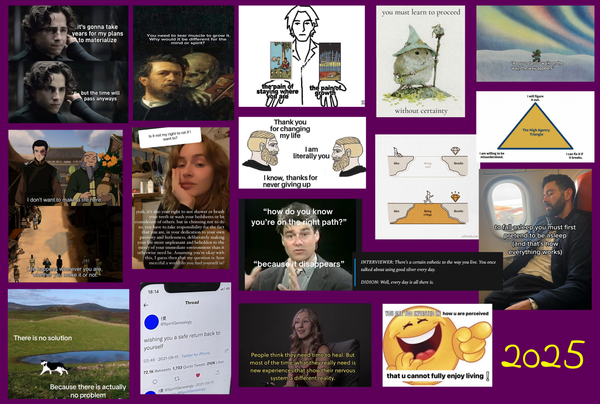30 life lessons turning 30
30 life lessons I learned over the past 30 years


I recently turned 30. Or rather, I turned 30 last year but I only managed to complete this post… now. So, here are 30 lessons among many lessons that have made me who I am today, or at least who I’m becoming. They may be the usual platitudes, but hey they work for me.
Tldr; they’re mostly managing my psychology and learning self-acceptance.
These are advices that I hope to continue: (In no particular order)
- We’re free to do whatever we want: We always have a choice (even if it means doing nothing). You don’t need anyone’s validation or permission. And it’s never too late to start anything. You can literally just decide and do the thing.
- We’re going to suck at something new, and that’s okay: And it’s better to fail than not try at all. You only get better by practicing and doing things consistently. What do we expect otherwise?
- Our habits (and how we identify ourselves) shape our future: Play the long game, because consistency is key. Don’t get too obsessed over the end goal; enjoy the process.
- We can still have fun doing things we’re not good at (yet): As long as you’re enjoying yourself, isn’t that what matters?
- Our value and worth are not defined by our work or productivity: Hobbies help to detach and find more meaning outside of our work.
- “Life has no meaning. Each of us has meaning and we bring it to life. It is a waste to be asking the question when you are the answer.” - Joseph Campbell. It’s different for everyone, so just go fuck around (explore) and find out.
- Because that’s the only way you can find out what you want and like.
- Alternatively, instead of obsessing over seeking purpose or meaning, why not just enjoy the life we already have?
- Take ourselves less seriously: Life is not that serious.
- Most of the time, everything is okay or going to be okay: We tend to overthink a lot.
- It’s okay to not know everything or to be in control of everything: Let some things go, especially if it’s not meant to be. Like I tell my team at work, it’s okay to embrace a little chaos.
- Sit with your feelings, and truly feel them: Don’t think your way out of your feelings. Sit with the discomfort, feel it in your body, let it pass, and then let it go. That’s one way to regulate your emotions. (Or at least, be gentle with yourself)
- Become comfortable with being alone: It’s better to be alone than to change yourself to fit into people’s lives.
- Balance creating and consuming things: Creating things makes me feel more alive - especially when I can also share it with others.
- If trying harder doesn’t work, why not try it gentler?
- We can only change ourselves, not others: You can try to influence people, but you cannot force them to change.
- Figure out your basic needs to feel better and ground yourself: Some of mine are taking walks, working out, getting some sun, reading, talking to friends, and watching episode one of Frieren.
- There is no real work-life balance, for work is part of life: However, work revolves around life, not your life around work (unless you’re okay with that).
- Our parents are humans too: Their past actions may not always be justifiable, but it becomes easier to forgive them when you realise they’re humans too who make mistakes and did their best. (Obviously this doesn’t apply to abusive households)
- Knowing our attachment style helps us identify our triggers and core beliefs that need healing: I’m more anxiously attached, and I tend to believe I’m not good enough which drives my fear of abandonment and rejection. We often link our adult relationships to how we were treated and loved as children. They are not the same!
- Have some hobbies and friends outside of your relationship: Codependency is not fun.
- Be there for your inner child to heal yourself: Most of our current actions and problems stem from emotional trauma inflicted during our childhood. See #18.
- Come from a place of wanting to do something, instead of feeling like you should: Should’s are a shame-based statement. When we don’t do what we think we should be doing, we feel bad and we feel like we’re not good enough.
- Put yourself out there, and when an opportunity is presented to us, just take it.
- Love alone is not enough to make a relationship work. Both sides need to put in the effort. Have the hard conversations.
- Be kind and empathetic: Understand the other person’s perspective. But take no shit from anyone if you’re disrespected.
- Ego can be a source of stress: It’s part of us that worries about how we’re perceived by others, for example, if you don’t do this work perfectly, we fear we’ll be seen as “not good enough” which leads to being shunned by others.
- Self-improvement is good, but constantly striving to improve can make us feel like we’re never enough: Learn self-acceptance too.
- Self-affirmation works wonders: The more you tell yourself something affirming, the more you believe in them, and the more confident you become. But the same goes if you tell yourself the opposite.
- Look for glimmers - the beauty in little things, the little wonders of life: Stay present and don’t forget to stop to smell the roses.
- Take action: Being self-aware of a problem is a good first step, but taking the next step — actually doing something about it — is another thing that’s even more important.
- This too shall pass: People come and go. And time will move on anyway. The good, the bad — everything will pass. Appreciate every passing moment whenever you can while it lasts.
Bonus:
- Change is scary, but staying the same is scarier.
- Forgive yourself. You only knew what you knew back then.
- A lot of things are honestly blocked by your emotions: Feeling lazy? What’s really blocking you from doing something?
Bonus bonus:
- The advice that we receive from others are what works for them: They may not always apply to us, so take these advices with a grain of salt.




